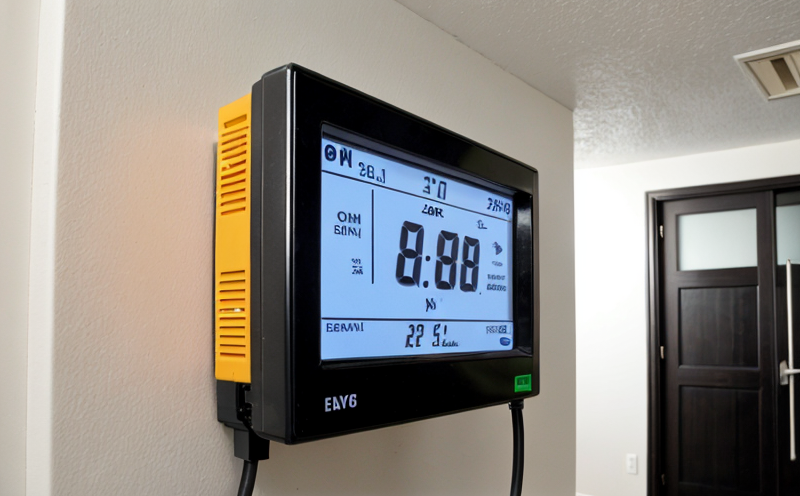ASHRAE 55 Thermal Comfort Efficiency Testing
The ASHRAE Standard 55-2017 defines environmental conditions that are thermally comfortable for the majority of the population. This standard is widely recognized and implemented in various sectors, including commercial buildings, healthcare facilities, and educational institutions.
Thermal comfort testing under this standard ensures that spaces meet or exceed the specified thermal comfort criteria to maintain occupant satisfaction and health. Compliance with ASHRAE 55-2017 is crucial for ensuring energy-efficient design and operation of buildings by reducing unnecessary heating, ventilation, and air conditioning (HVAC) loads.
Our laboratory adheres strictly to the latest version of ASHRAE 55-2017, incorporating the use of advanced thermal manikins and sophisticated computational fluid dynamics (CFD) modeling techniques. These tools enable us to simulate real-world conditions accurately, providing reliable data for clients seeking to optimize their HVAC systems.
The testing process involves several key steps, starting with the selection of appropriate test parameters that align with the intended use of the space. Common parameters include air temperature, humidity levels, radiant heat transfer, and air movement velocity. Specimen preparation focuses on creating a realistic simulation environment that closely mirrors actual operational conditions.
Once the test setup is complete, our team uses advanced instrumentation to measure critical variables throughout the testing period. This includes thermocouples for precise temperature readings, hygrometers for humidity measurement, and anemometers for assessing air flow dynamics. Our state-of-the-art CFD software helps us analyze these data points in real-time, ensuring accurate compliance assessments.
The results of our ASHRAE 55-2017 thermal comfort testing are comprehensive and detailed, providing clear insights into the performance of HVAC systems. These reports serve as valuable tools for quality managers, compliance officers, R&D engineers, and procurement teams alike. They can be used to identify areas for improvement in existing designs or inform decisions regarding new construction projects.
By leveraging ASHRAE 55-2017 thermal comfort testing, organizations not only enhance occupant satisfaction but also contribute positively to sustainability goals by reducing energy consumption associated with HVAC systems. This aligns perfectly with broader initiatives aimed at promoting green building practices and fostering a more sustainable future.
- Our team of experts ensures that all tests are conducted according to the latest ASHRAE guidelines, guaranteeing accurate and reliable results.
- We offer flexible scheduling options tailored to meet your project deadlines without compromising quality.
- Our comprehensive reports provide actionable insights based on detailed analyses performed during testing.
- We support clients across multiple industries, including commercial real estate, healthcare, education, and government sectors.
Eurolab Advantages
At Eurolab, we pride ourselves on delivering unparalleled service excellence in energy efficiency testing. Our commitment to precision, accuracy, and reliability is unmatched within the industry.
We invest heavily in cutting-edge technology and continuously train our staff to stay abreast of emerging trends and best practices. This ensures that every test conducted at Eurolab meets or exceeds international standards.
Our dedicated team works closely with clients throughout the entire testing process, from initial consultation through final report delivery. This collaborative approach fosters stronger relationships built on trust and mutual respect.
We understand that each client has unique needs; therefore, we tailor our services to fit those specific requirements. Whether it's a one-time assessment or ongoing support, Eurolab is committed to providing customized solutions designed specifically for you.
Our strong reputation in the field is supported by numerous successful projects across diverse sectors. Clients consistently praise us for our professionalism, efficiency, and attention to detail.
Customer Impact and Satisfaction
At Eurolab, we are dedicated not only to providing exceptional technical services but also ensuring that these efforts directly translate into tangible benefits for our customers. By offering ASHRAE 55-2017 thermal comfort efficiency testing, we empower organizations across various sectors to achieve greater energy savings and improved indoor air quality.
Our comprehensive approach helps businesses reduce operational costs while enhancing overall environmental sustainability. For healthcare facilities, this translates into better patient outcomes; for educational institutions, it means safer classrooms; and for commercial buildings, it results in more efficient operations and lower utility bills.
The feedback we receive from satisfied clients further reinforces our dedication to excellence. Many have reported significant improvements in their HVAC system performance following rigorous testing under ASHRAE 55-2017 guidelines. They also appreciate the detailed insights provided in our reports, which help guide future improvements and upgrades.
Moreover, compliance with this standard enhances an organization's reputation as a leader in sustainability and energy management. It demonstrates commitment to creating healthier environments for occupants while contributing positively to global environmental goals.
International Acceptance and Recognition
- ASHRAE Standard 55-2017 has gained widespread acceptance globally, particularly in North America and parts of Europe where comfort requirements are stringent.
- The standard is widely recognized by international bodies such as ISO (International Organization for Standardization) and ASTM International (American Society for Testing and Materials).
- Many countries have adopted ASHRAE 55-2017 into their national codes, ensuring consistent application worldwide.
The standard's broad acceptance underscores its relevance in addressing thermal comfort issues across diverse climates and building types. Its international recognition reflects the global commitment to improving indoor environmental quality and promoting energy-efficient practices.





